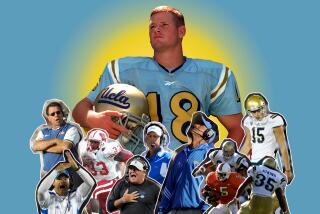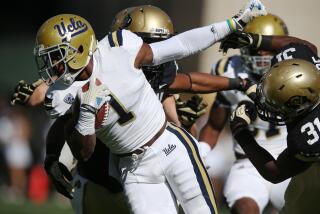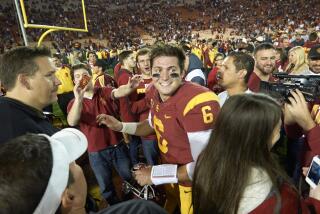Fifth-Down Win Thrown Back in 1940
- Share via
Fifty years ago, aided by a confused referee who gave Cornell a fifth down with three seconds to play, the Big Red beat Dartmouth, 7-3, in a memorable football game at Hanover, N.H.
Fifty years later, on Saturday, much the same thing happened at Columbia, Mo., when Colorado beat Missouri, 33-31, on a fifth-down touchdown.
On the surface, the two finishes are strikingly similar: Seconds remaining . . . confused officials . . . a winning play . . . angry protests.
There is one major difference.
In November, 1940, no one had to demand, plead, beg or even ask Cornell to relinquish its victory. Cornell simply surrendered it.
On Nov. 16, 1940, heavily favored Cornell, ranked No. 1 in the nation, carried an 18-game unbeaten streak into its game at Dartmouth, which was 2-5. Dartmouth took a 3-0 lead early in the fourth quarter.
With 2:30 to play, Cornell took possession at Dartmouth’s 42-yard line. The Big Red drove to a first down at the Dartmouth six, with 45 seconds to play. After three running plays, Cornell had reached the one. The Big Red was then penalized for calling a timeout after it had used its last, and the ball was placed at the six.
A pass play into the end zone on fourth down failed. Dartmouth’s players and fans rejoiced. However, referee William H. (Red) Friessel placed the ball on the six and signaled fourth down for Cornell. The Big Red halfback, Bill Murphy, caught quarterback Walt School’s pass in the end zone with three seconds remaining--on fifth down.
Dartmouth captain Lou Young protested to Friessel, to no avail.
Less than 48 hours later, after reviewing films of the final five plays, and after referee Friessel had publicly acknowledged his error, Cornell President Edmund Ezra Day voluntarily forfeited the victory, and Dartmouth was declared the winner by a 3-0 score.
Speaking that day at a campus rally, Day, a Dartmouth graduate, talked of honor.
“If we hadn’t made that decision,” he said, “we’d have been explaining that game as long as football has a place in intercollegiate athletics--and I want no ‘Long Count’ on Cornell’s athletic history.”
Writing of Cornell’s decision that day, Arthur J. Daley wrote in the New York Times: “This action is unprecedented in intercollegiate football. Friessel had the courage to admit he had been wrong and Cornell had the sportsmanship to yield a success it felt it had not rightfully earned.”
In a written statement, Friessel said: “The mistake was entirely mine as the game’s referee, and not shared in or contributed to by any of the three other officials.”


